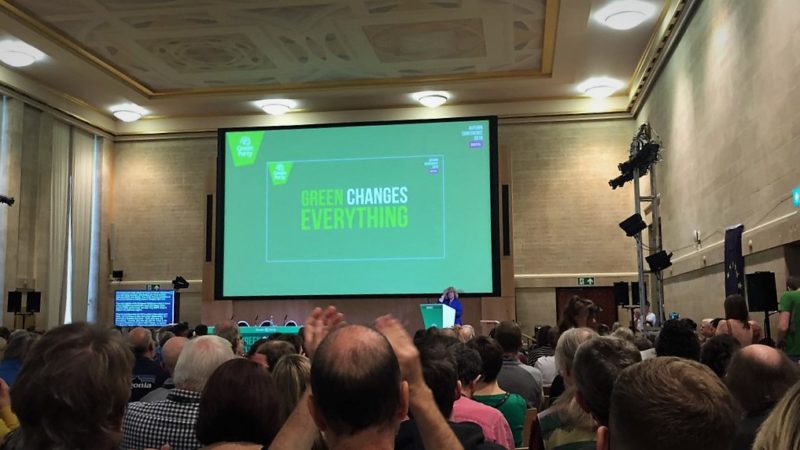While some say they make the party more efficient, others say they are too hierarchical

Members of the Green Party of England and Wales have voted in favour of a series of internal reforms.
In a referendum, 70% voted in favour of the ‘Holistic Review’ reforms on a turnout of 16%. The reforms have previously been approved by the party’s conference.
Those in favour of the reforms argue that they will modernise the party and make it more effective – without any loss to internal party democracy.
Opponents though say the reforms add unnecessary hierarchy and go against the party’s grassroots principles.
The main reform is the creation of a new 45-person Council whose members will be elected.
According to former leader Natalie Bennett, who helped draw up the reforms, this council will replace a “complex system of committees”.
While conference will remain the supreme decision-making body, she said the council will be a representative body, getting things done and making decisions between conferences.
The Council will operate through so-called ‘task and finish groups’. These will be small groups of volunteers, performing set time-limited tasks and then dissolving.
The Council will also oversee two standing bodies – the Board and the Political Executive (PEX).
The Board will be a group of people appointed because of their experience and expertise in doing things like accounts, human resources and electoral expenses.
The Political Executive, according to Bennett, “aims to be a more transparent, inclusive way of bringing our council and parliamentary reps into decision-making, particularly day-to-day calls that need to be made in reaction to events”.
While Bennett argues the party will become more efficient without losing any democracy, others (particularly in the youth wing of the party) disagree.
Erin, a 19-year old member said on Twitter: “I’m pretty disappointed Holistic Review passed. It adds unnecessary hierarchy and goes against the grassroots foundations of the party. It may make us more electable but it severely compromises on principles.”
Tom Pashby, a member of the Green Party’s executive, said they were “concerned because it diminishes the voice of [the Young Greens youth wing].” Young Greens will no longer be guranteed representation on the party’s governing bodies.
The Young Greens campaigned against the Holistic Review proposals. Their official twitter account said today that the changes would leave them financially short by up to £1,000 a year – a third of their total budget.
This is because the changes remove the requirement for the party to hold two conferences a year. Conferences are a key fundraising opportunity for the Young Greens.
Party co-leaders Jonathan Bartley and Sian Berry have promised to meet with Young Greens to discuss how they can recoup the funding they’re losing out on.
The post of trade union liasion officer has also been removed by these reforms. The current trade union liasion officer Paul Valentine tweeted:
The Green Party Holistic Review has passed. A raft of reforms, some of which will no doubt be useful, but alas, that’s me as Trade Union Liaison Officer gone. I might comment further later, but I’m off to my job in the gig economy. Peace out.
Joe Loh is a freelance journalist and a reporter for Left Foot Forward.




One Response to “Greens vote in favour of controversial internal reforms”
Dave J.
So, as the Labour party slowly (finally!) rediscovers democracy the Greens begin to emulate the old-labour style hierarchy-rules-all structure in the supposed hope it will make them ‘electable’ (now who have I heard over the past few years espousing ‘electability’ as their favorite excuse for holding on to power…)
I might jest about it, but the spouters of ‘electability rules all’ dictats in the other almost-progressive UK party were the worst enemies of democratic progress it’s possible to imagine outside the tory party (or maybe tory & lib-dem-tory-lite) 🙁
This is potentially a very very sad day. IMHO the Green’s biggest weakness is a major cohort of idealistic-but-unread hopeful souls among their member base and even within their leadership.